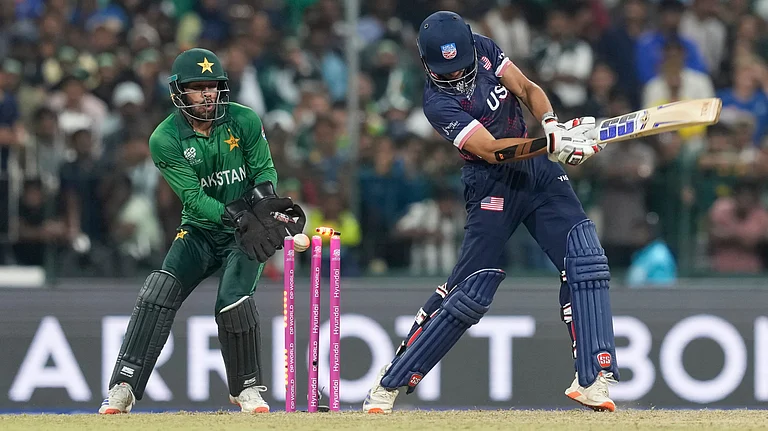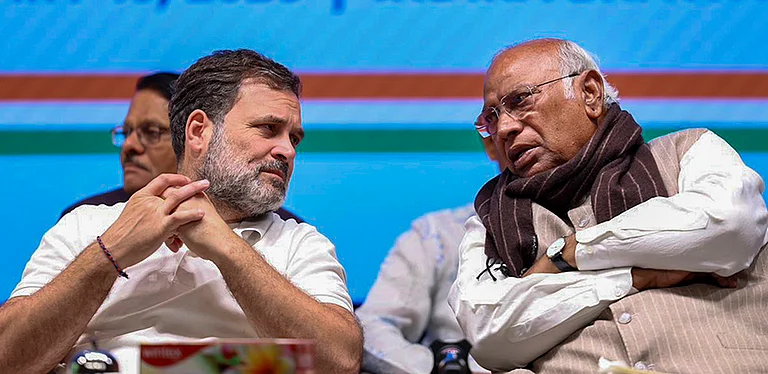On March 19, the usually cautious CII Director-General Tarun Das threw a bombshell at TNCs. His charges were serious: many recent TNC entrants were in India for short-term 'one-night stands', adopting a marauder-like 'cowboy' approach, palming off obsolete technology and attempting to muscle out their joint venture Indian partners by trying to hike their equity-holding to more than 50 per cent (see box).
Das' close friends, Finance Secretary Montek Singh Ahluwalia and Principal Secretary in the Prime Minister's Office A.N. Verma, were shell-shocked by the salvo. Congress leaders went into a huddle, debating whether they should incorporate the CII's new-found love for swadeshi in the party's election manifesto. It was evident that the CII was pressuring the Congress to take a fresh look at its TNC policy if it returned to power. And making the right noises if the BJP won the elections. Above all, a band of big Indian industrialists was asking for some form of protection against TNC rivals. Interestingly enough, within days of issuing his statement, Das left the country, allegedly to talk to potential investors.
The BJP was initially elated by Das' outburst, which was tantamount to an endorsement of the party's swadeshi stance. But, on second thoughts, the BJP leadership appears to have seen through what appears to be a case of an apex chamber playing political games. Says BJP General Secretary K.N. Govindacharya: "The CII is under an illusion if it thinks that TNC dominance can be replaced by big national business overpowering the small and medium-scale entrepreneur."
Govindacharya is more than sceptical about the CII's new stand. Says he: "Today, it may seem that the CII is against the Congress policies on TNCs, tomorrow it may be a different story. I think it is best not to pay too much attention to people who take different positions from time to time." And for good measure, he adds: "We don't need the CII's endorsement for our economic policies like swadeshi; it's the mandate of the masses that counts." But on March 27, a CII delegation led by its president, Rajive Kaul, invited former BJP president Murli Manohar Joshi to the CII's annual general meeting in mid-April.
Was Das' TNC-bashing a mere attempt at resurrecting what the media had termed the Bombay Club, led by industry big guns like L.M. Thapar, Rahul Bajaj and Hari Shankar Singhania, which had, in 1993, taken upon itself the task of demanding a 'level playing field' for national industry? Or was it because the CII, anticipating that the BJP seats, thought it best to offer the party an olive branch? At least in Maharashtra, Gujarat and Rajasthan, which have a total of 99 Lok Sabha seats, the BJP is in a strong position, say political observers. And these are the states where many CII members have their business empires.
If the CII is indeed playing a political game by using the TNC issue, it is sad and the harbinger of bad news, says a top executive of another apex chamber on condition of anonymity. Says he: "If apex business chambers start soiling their hands with politics and take sides, we would eventually hang between the devil and the deep sea." He notes that with the elections so near, it's obvious bad timing to raise the TNC bogey now.
Agrees Arun Bharat Ram, vice-chairman and managing director, SRF Ltd: "The timing for raising the TNC issue is not the most opportune now. If the CII wanted to start a debate on TNCs, they should have waited till the elections were over. In any case, no government can take a decision until it comes to power." Adds K.N. Memani, president, Indo-American Chamber of Commerce: "With foreign investors already worried what policy changes would be brought about by a new government, the CII statement is only further adding to the confusion."
And as Parvinder Singh, chairman and managing director, Ranbaxy Laboratories, notes, "With India firmly on the path of globalisation, it does not make sense for a section of Indian industry to raise anti-TNC slogans. As we require the latest technology to be competitive in the world market, we need to be close to TNCs."
And what of the 'cowboy' approach and 'one-night stands'? "If this is at all true," points out Singh, "the Indian partner should also be blamed and not just the TNC alone." On the question of putting a cap on TNC equity holdings, which the CII appears to be demanding, he says that there are several areas where, if TNCs are not given majority stakes, they might not be interested in bringing in state-of-the-art technology. But he is not in favour of allowing across-the-board 100 per cent ownership by TNCs as this might, directly or indirectly, go against Indian industry. He adds: "This kind of a system might work in the West, but India should definitely learn from the examples of Asian Tigers like China and Taiwan."
The CII, of course, vehemently denies that it is indulging in TNC-bashing. "The timing may be unfortunate with the elections coming up," says Ajit Gulabchand, CII western region president, "but the moot point we're trying to make is that the liberalisation process can't be skewed in any direction; it has to be uniform and omni-directional. For instance, if you want foreigners to enter the consumer goods sector, it's fine by us, but then reform yourcountry's monetary policy to bring interest rates at par with global standards."
Says Kaul: "The CII is not against TNCs. In fact, it is very much in favour of them establishing long-term partnerships on a win-win basis." Besides, the CII is apolitical, he insists: "The statement has nothing to do with politics. It is not a campaign, it only states some concerns and strategies for TNCs to come in and have their base here on a long-term basis."
But it may already be too late for such damage-control statements. The harm may have already been done. As FICCI Secretary General Amit Mitra says: "We have indications that foreign investors are deeply disappointed with the high-wire act and sudden outburst, charges, rhetoric and volte-faces by a section of Indian business."
FICCI is organising trips of Indian businessmen to the US, Germany, Italy and Japan between April and June to attract foreign investment from small and medium overseas entrepreneurs dealing in hi-tech areas. Says Mitra: "While it may be somewhat easier for big foreign investors to put the rhetoric against TNCs in the right context, we are concerned that medium and small overseas investors may begin to develop cold feet with this kind of political posturing before election time." Says V. Raghuraman, ASSOCHAM secretary-general: "The CII statements against TNCs are too harsh. I do not know what came upon them to single out TNCs and accuse them of a cowboy attitude."
A view circulating in industry circles is that some prominent CII members, who feel that their fortunes have been affected by increased TNC presence in India, are behind the current tirade (see box). Officially, the association denies this. "The CII has a fair degree of consensus in its approach to TNCs," Kaul stresses. But, says R.C. Bhargava, CII member and managing director, Maruti Udyog Ltd: "I don't think what Das has said reflects the majority view of the CII. I don't agree with Rahul Bajaj's view that there should be restrictions on TNCs. I am for freer approach. What's the difference between an TNC having an equity stake of 51 or 75 per cent?"
But, points out former CII president Subodh Bhargava: "The earlier TNCs were allowed to have only 51 per cent holding while, within one year, others have been allowed to hold even 100 per cent. This is leading not only to tension within the TNC themselves, but also to a grudge that the latter got a better deal. It is clearly becoming case of the early birds getting no moss. "All we're asking for is transparency in the Government's TNC policy," adds Gulabchand. "The CII has found over the past years that several TNC entries have been rather arbitrary. That confuses Indian industry and is unfair to the foreigners.
"Dissent and serious differences among members are apparently gnawing at the credibility of the CII, which had in the past few years emerged on top of other apex chambers, thanks reportedly to patronage from the Congress regime in New Delhi. And further eroding the credibility of the CII is its strange doublespeak. A few months ago, a high-profile four-member CII committee was formed, headed by former CII president Dhruv M. Sawhney, to look into a number of aspects of the economy, including equity holding by transnationals. Though the committee is expected to make its recommendations in the form of a white paper soon, officially the CII even denies the existence of such a panel. Is there something to hide?
And what about the credibility of the CII's charges against TNCs? "Just because an odd TNC may be guilty, it doesn't give them the freedom to generalise about all transnational corporations," says Bhargava of Maruti. "At least 95 per cent of TNCs are in India for a long haul," adds Arun Bharat Ram. On the charge that TNCs are passing on obsolete technology, he says: "It's just not possible to do so under the current competitive global business environment. If one TNC is not willing to part with the latest technology, there are many others which are keen to do so."
As FICCI's Mitra points out, the capacity of the telecom switches being manufactured in India by foreign majors like AT&T, Fujitsu, Ericsson and Alcatel is 2,50,000 telephone lines, more than six times the size of C-DOT's 40,000. So why this talk of obsolete technology? Says Mitra: "Of the $9 billion foreign investment sanctions since lib-eralisation was initiated in 1991, about 55 per cent is in sectors in which any government would want them—telecom, power, hydrocarbons, machine tools and metallurgical sectors. There's no question of short-term gains here. A little more than 3 per cent of foreign invest-ment sanctions are for the food processing industry, half of which is in hi-tech export packaging and only a small fraction is in the so-called 'potato chips' sector."
According to ASSOCHAM's Raghuraman, as much as 85 per cent of foreign investment is in the core sector. Companies like Pepsi have lost a lot of money in India and if itwas a 'one-night stand' as alleged, such TNCs would have left the country long back, he adds.
But while in East Asian countries, 70 per cent of foreign investment is foreign direct investment (FDI), and the remaining 30 per cent portfolio investment, in India the reverse is true. The situation has now improved slightly, with the share of FDI increasing to 35 per cent. Mitra says that FICCI's research shows that the ratio of FDI to portfolio investment increases only when small and medium foreign investors also enter the country. He thus believes that India could have an even balance of 50:50 between FDI and portfolio investment in the next two to three years. But with the wrong signals sparked off by the CII tirade, the growth of foreign direct investment could receive a setback.






















